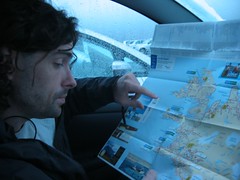January 21st, 2013 § § permalink

first, a disclaimer. in light of recent political events and unrests in slovenia, i’d like to stress that this post is not meant to take any sides. i’ll merely try to point out to a project that might otherwise go unnoticed.

English: Detail from Government. Mural by Elihu Vedder. Lobby to Main Reading Room, Library of Congress Thomas Jefferson Building, Washington, D.C. (Photo credit: Wikipedia)
last year, i’ve spend a couple of days reading our national budget. the purpose of the exercise was to find ways to create something not unlike the famous ‘death and taxes’ infographic. i was pleasantly surprised with the fact, that our budget is actually very well designed, with fascinating inherent structure of programs and spenders, but unpleasantly not-surprised, that it was published as PDF.
to create an infographic with such complex data, that should be rebuilt every year, one needs programmatic ways to process it. so i ended up parsing the pdf, with many silly problems on the way. but it worked, and i’ve published the broken-down version for the years 2010-2012.
that was in spring, and ever since i’ve been waiting for the new government to finally publish the budget that was supposed to govern us this year, so i could compare it with the old ones. i really resent the fact that the budget was kept unpublished all throughout the legislative process. i really feel it’s an insult to the citizens.
but, they finally published it last week, and to my great surprise, they’ve really made an effort – they published detailed explanations of each section, and, ta-da-da-da, we have machine-parsable CSV files as well!
i realize it’s not perfect, but it’s light years ahead of what we used to have to deal with. so, who’s up for some info-charting now? 😉
December 3rd, 2012 § § permalink

serious large scale demonstrations are going on in my home town last few days. the last time so many people gathered in protest was before we joined nato, in the height of anti-globalism movements of 2001. unfortunately it’s not that simple this time.
 Bob at Piran Café blog in Slovenia shares this photograph in the Boing Boing Flickr Pool. On his blog, he explains: This [photograph of a policeman behind a riot shield] was taken at about 6 pm last night, shortly after protesters were giving carnations to police officers stationed in front of Parliament.
Bob at Piran Café blog in Slovenia shares this photograph in the Boing Boing Flickr Pool. On his blog, he explains: This [photograph of a policeman behind a riot shield] was taken at about 6 pm last night, shortly after protesters were giving carnations to police officers stationed in front of Parliament.
via: boingboing.net
these demonstrations have nothing to do with neo-nazi’s, political disagreements or economic recession. they are just about people finally understanding that disillusionment is nothing without action. so far we assumed that politicians are paid to do a job of managing the country, just like profesional managers.
one thing that foreigners can’t understand from reports about neo-nazi groups in the otherwise quite city is that slovenians are normally very serious about in-activity. they should have protested any number of times in the last decade, or at least vote for different people the last 5 times they had a chance.
but they didn’t. they know the democracy doesn’t work, so they don’t bother with elections. neither they would bother with coming forth with plans to improve parts of it. instead they would complain a lot, and look at the most promising new european country flounder. slovenians have proven to be very good at feeling helpless.
we didn’t have corrupt elections yet, people actually voted for corrupt majors. some voted for them because they don’t know better. the others didn’t bother going to elections, or engaging in actions / conversations that would raise the profile of counter-candidates. it’s a pattern we have seen over and over again in our history of elections – rule of thumb is 30% voters turn-up is guaranteed, and 60% of them will vote for the commonly recognized worst option. dare to count how many times this was deemed ‘majority’ ? dare to guess how representative this sample is?
so getting 10k people on the streets is a great success, and hopefully a sign of changes to come. this post is more intended for fellow readers in slovenia, who are very good at amplifying opinions, but i’d like to provoke you to actually fucking do something. vote, vote more carefully, talk about issues when there is time to do something about them.
i wouldn’t even ask the next complaining slovenian: “and what did you do to make things better?” – they wouldn’t get it. the right questions is: “and what have you not done to contribute to this mess?”
August 23rd, 2012 § Comments Off on 13 counterintuitive business truths § permalink

I actually like this article, in spite of the new-age-y feeling to it.. something to keep in mind all the time, but know that there is no truth. I often get too worried about finding out the truth, when all is needed is just a decision. It’s a Slovenian thing…
 7 modern workplace myths Here are 13 counterintuitive business truths I’ve come to know, even if I can’t exactly explain why they make sense. The first truth actually relates to that very subject: the how and why of things. To understand how things work, just observe; don’t ask why. This is more or less the Tao Te Ching in a nutshell.
7 modern workplace myths Here are 13 counterintuitive business truths I’ve come to know, even if I can’t exactly explain why they make sense. The first truth actually relates to that very subject: the how and why of things. To understand how things work, just observe; don’t ask why. This is more or less the Tao Te Ching in a nutshell.
via: www.cbsnews.com
- Embrace the counterintuitive (davidhieatt.typepad.com)
- Frustration; Truth is in the calm (bbroseproductions.wordpress.com)
- Counterintuitive results (cutandplante.wordpress.com)
August 18th, 2012 § Comments Off on Slovenian Startups: it’s personal § permalink
Roughly three quarters of the webpages of Slovenian startups don’t say who the founders are. Not on the front page, not on the about page, nowhere. Most of the list the tax ID numbers and official address of the company, but not the names of the people running it.
This is a catastrophe! Are you trying to hide your head in the sand until the success ‘happens’, and only after that will you collect the credit? The founding fathers of America wrote their names on the Constitution, before it was a success.
Every young company has two major challenges when it comes to public communication:
- how do I tell enough people we exist?
- how do I make them trust us with their money?
The best answer to the first one is – go out of the office and talk to people on events and in their native environment. It’s also a great way to get to know your core audience inside-out.
But for the trust issue, the absolutely best remedy is for the founders to be put up front, essentially saying loud and clear: “Trust Me”. Don’t just trust the words I’ve written (they are wrong), don’t trust the design (it’s bad), don’t trust what you heard on the street about us (it was probably wrong), trust ME, I believe in what we are doing, I believe we are changing the world into a better place, and should something bad happen, I will feel ashamed to death.
So startup founders, please, write your names everywhere you can and be proud of it. There is no other way your startups will succeed.
August 17th, 2012 § § permalink

We live in amazing times – in a couple of years, we will have digitized all books every published (that survived), and we will be able to apply machine learning to the past. It will spur a whole new era of historiography.
 #linguistics With millions of books scanned and digitized by Google, a new type of linguistic analysis has become possible – as people are able to delve into hundreds of years and millions of books’ worth of data.
#linguistics With millions of books scanned and digitized by Google, a new type of linguistic analysis has become possible – as people are able to delve into hundreds of years and millions of books’ worth of data.
via: io9.com
… that the research has been done by a fellow Slovenian is not a coincidence – lots of talent over here 😉
June 6th, 2012 § Comments Off on For Tech Start-Ups, New York Has Increasing Allure § permalink


English: I took photo of CNN building in New York City with Canon camera. (Photo credit: Wikipedia)
this article is the most accurate description of New York as a tech hub:
Enlarge This Image Chester Higgins Jr./The New York Times Doug Imbruce, the founder of Qwiki, an interactive video start-up, recently decided to move his company back to New York. Chester Higgins Jr./The New York Times Employees of Qwiki, located on Spring Street in SoHo.
via: www.nytimes.com
in a nutshell, the takeaways are:
- partners: “Many new start-ups benefit from proximity to the media, advertising and fashion industries, New York’s strengths.”
- financing: “The number of venture capital deals in the city has risen 32 percent since 2007, while the figures for other areas, including the Valley, have dropped.”
- it’s the greatest city on the planet: “he did not have to rely on hiring New York-based engineers. Instead, he found them elsewhere and convinced them to move.”
- it’s a hipsterville: “Those at start-ups in New York repeatedly mention the intimacy of the relatively small but tight-knit industry here — in fact, they may be the only people who say they moved to New York because they liked its small-town vibe.”
- keeps you humble: “In New York, no one’s ever heard of Quora,” “In New York, it keeps you humble that you walk out and there’s the CNN building.”
- it’s rational: “I don’t like New York,” he said. “I just think it’s the best place for my business.”
… excuse all the quotes this time, they are by various people from the same article.
June 4th, 2012 § Comments Off on piano media’s lessons on geography § permalink


OpenStreetMap Logo (Photo credit: Wikipedia)
I’m amused by the US media’s understanding of European geography / economy:
Piano Media, the joint web news payment system operating in Slovakia and Slovenia, is preparing to launch in a third, larger market this summer, after recently taking funding for globalisation. “The third country we are launching in July will be much larger than the two we already have combined,…
…
There is a question mark over whether Piano can replicate even these small numbers outside its own back yard…
via: paidcontent.org
… to think that slovenia is slovakia’s backyard, or that they are both the same backyard, is like saying US and Panama are the same backyard.
on the other hand, I’m glad Piano did their tests in these two countries, because now maybe more westerners will actually learn to tell us apart.
June 1st, 2012 § § permalink


Ólafur_Ragnar_Grímsson (Photo credit: Wikipedia)
Business Insider has a great interview with Ólafur Ragnar Grímsson, who has been President of Iceland since 1996, and announced last month he would be running for a fifth term.
It is an incredible read, because he is obviously very smart and very ethical person, a rare gift for politician these days. I wish everyone in Slovenia read this and adjust their expectations on how a public leader should behave, react, lead. He makes several super-insightful points, that clearly come from a lot of experience and thought.
For instance, about the importance of the banking sector:
As everybody knows now, we did not pump public money into the failed banks. We treated them like private companies that went bankrupt, and we let them fail. Some people say we did it because we didn’t have any other option, there is clearly something in that argument, but it does not change the fact that it turned out to be a wise move or whatever reason. Whereas in many other countries, the prevailing orthodoxy is you pump public money into banks and you make taxpayers responsible for the banks in the long run, and somehow treat the banks as if they are holier institutions in the economy than manufacturing companies, commercial companies, IT companies, or whatever.
…
Capitalistic financial markets can exist in many other parts of the world, even without democracy. So in my opinion, Europe is and should be more about democracy than about financial markets. Based with this choice, it was in the end, clear that I had to choose democracy.
… and one positive story on journalism – i wish more media aspired to be this fair when they are judgmental:
One has to hand it to the editorial board of The Financial Times and The Wall Street Journal, that they supported Iceland’s case all along. And if The Financial Times and The Wall Street Journal, who have never been special friends of Iceland, saw through this argument by the British and the Dutch government, why on earth didn’t the other European governments do so?
… and a match point for creative industries (which includes startups btw):
the Icelandic banks, like all modern big banks in Europe and America and all the other parts of the world, are no longer banks in the old-fashioned way. They have become high-tech companies. High-ranked engineers, mathematicians, computer scientists, programmers and so on and so forth. And their success depends largely on how successful they are in hiring people with this education and capability, not necessarily those trained in business schools or finance, but in engineering, mathematics, computer science and so on.
…
So the lesson from this is: if you want your economy to excel in the 21st century, for the IT, information-based high-tech sectors, a big banking sector, even a very successful banking system, is bad news for your economy.
… about the inherent problem of all ‘ecosystems’ – clubbing
And I said to myself — I know it’s a mistake now — in early 2007, if all the credit agencies are giving the Icelandic banks a clean bill of health, these pillars of European banking are doing integral business with the Icelandic banks, these critical voices are not really onto what’s happening.
… and an example of true collaboration, going on without the media really noticing it…
Fortunately, during this time when there was very little attention to the Arctic, the eight Arctic countries were able peacefully, almost off the radar, to develop co-operation within the Arctic Council, and to consolidate the peaceful and constructive dialogue among Russia, the United States, Canada, and the five Nordic countries.
Read more: http://www.businessinsider.com/olafur-ragnur-grimsson-iceland-2012-4
May 30th, 2012 § Comments Off on ‘The Golden Age of Silicon Valley Is Over, and We’re Dancing on its Grave’ § permalink


Memory is a Golden Sieve (Photo credit: kern.justin)
… following a point from yesterday, it seems US economy is catching up with Europe:
BLANK: I teach science and engineering. I see my students trying to commercialize really hard stuff. But the VCs are only going to be interested in chasing the billions on their smart phones. Thank God we have small business research grants from the federal government, otherwise the Chinese would just grab them.
via: www.theatlantic.com
May 23rd, 2012 § § permalink


iceland (Photo credit: osmium)
Iceland has a unique opportunity to lead the world by defining a Internet Enterprise Zone, Brad Burnham of Union Square Ventures defined this term to me while he was in Iceland. What do we mean by this IEZ? We mean a Policy framework focused on allowing innovation in the Internet space.
via: blog.startupiceland.com
I recently visited Iceland (again) and had a privilege to meet some of young entrepreneurs there. The amount of startups and interest in
entrepreneurship is amazing, specially if you consider that the whole country is the size of Ljubljana, Slovenia Capital.
The locals told me that the financial crisis hit everyday people pretty badly, specially because they actually weren’t doing anything wrong –
normal people were as scrappy as you’d expect from a scandinavian. They have also been very resourceful throughout history, probably a result of
harsh weather and soil conditions.
Oh, and every citizen has Facebook profile, which makes them super efficient at forming a new constitution. The rest of us should observe and learn.



 Bob at
Bob at 

 7 modern workplace myths Here are 13 counterintuitive business truths I’ve come to know, even if I can’t exactly explain why they make sense. The first truth actually relates to that very subject: the how and why of things. To understand how things work, just observe; don’t ask why. This is more or less the
7 modern workplace myths Here are 13 counterintuitive business truths I’ve come to know, even if I can’t exactly explain why they make sense. The first truth actually relates to that very subject: the how and why of things. To understand how things work, just observe; don’t ask why. This is more or less the 

 #
#









